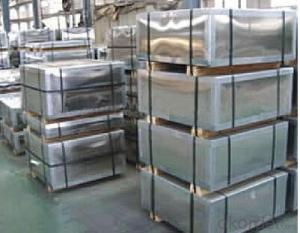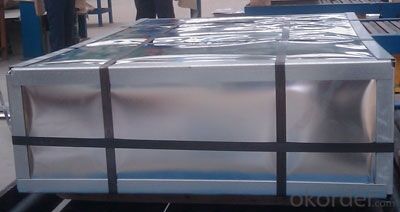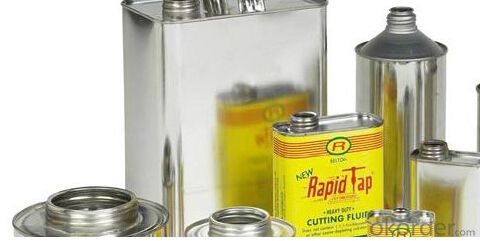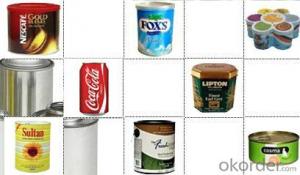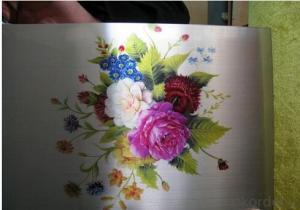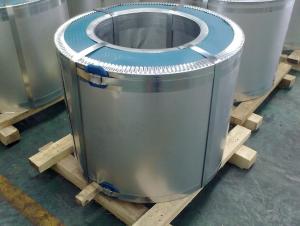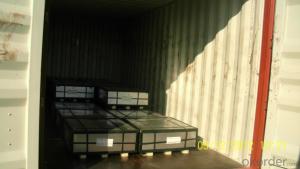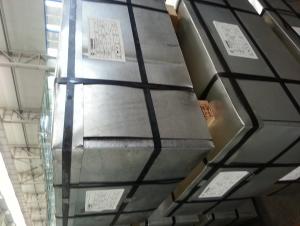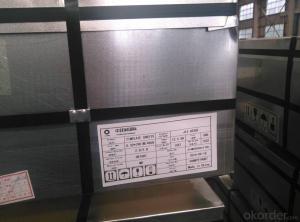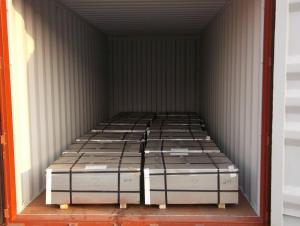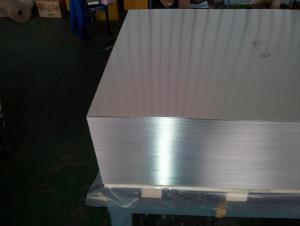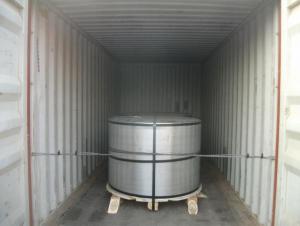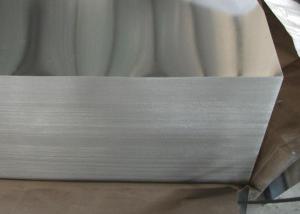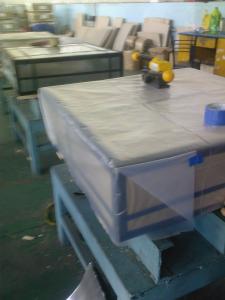Tinplate Used for Aerosal Cans in Packaging Industry
- Loading Port:
- China main port
- Payment Terms:
- TT OR LC
- Min Order Qty:
- 25 m.t.
- Supply Capability:
- 30000 m.t./month
OKorder Service Pledge
OKorder Financial Service
You Might Also Like
1. Products: Tin Free Steel
Tinplate and TFS are widely used for making all types of containers such as artistic cans, tea cans, painting cans, chemical package cans and metal printing etc. Its applications are not limited to containers; recently, they have also been used for making electrical machinery parts and many other products.
2. Specification:
Our goods enjoyed high quality both at home and abroad. We can supply tin free steel as follows:
Technical standard | JISG3315 and GB/T24180 - 2009 (BS EN 10202:1990) |
Steel Type | MR / SPCC |
Thickness | From 0.15mm to 0.50mm (Tolerance +/- 0.01mm) |
Width | Normally 600-1050mm (Tolerance +3/-0 mm) |
Coating | Total chromium min 30mg/m2 max 140mg/m2 |
Temper & Annealing | T1-T5, DR7-8, TS230-TH435, T49-T65(+/- 4) |
Surface Treatment | Bright & Fine Stone & Stone & Silver & Matt |
Payment terms | Letter of Credit (L/C), Telegraphic transfer (T/T) |
Price terms | CFR & CIF price term |
Delivery time | Within 60 days after received L/C or T/T down payment |
Packing | High quality shipping packing which contains thin plastic film, rust-proof paper, metal cover, metal angles and strap sand pallet. |
Minimum order Quantity(MOQ) | 25 metric tons (1X 20'' container) |
3. Pictures:
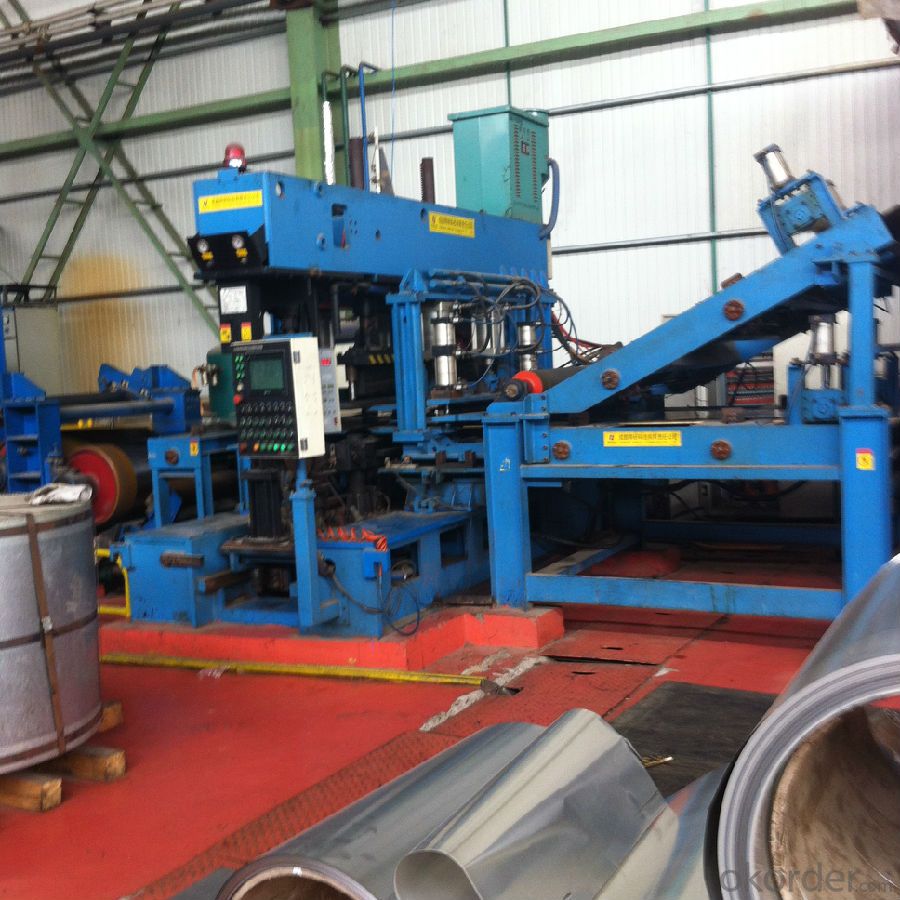
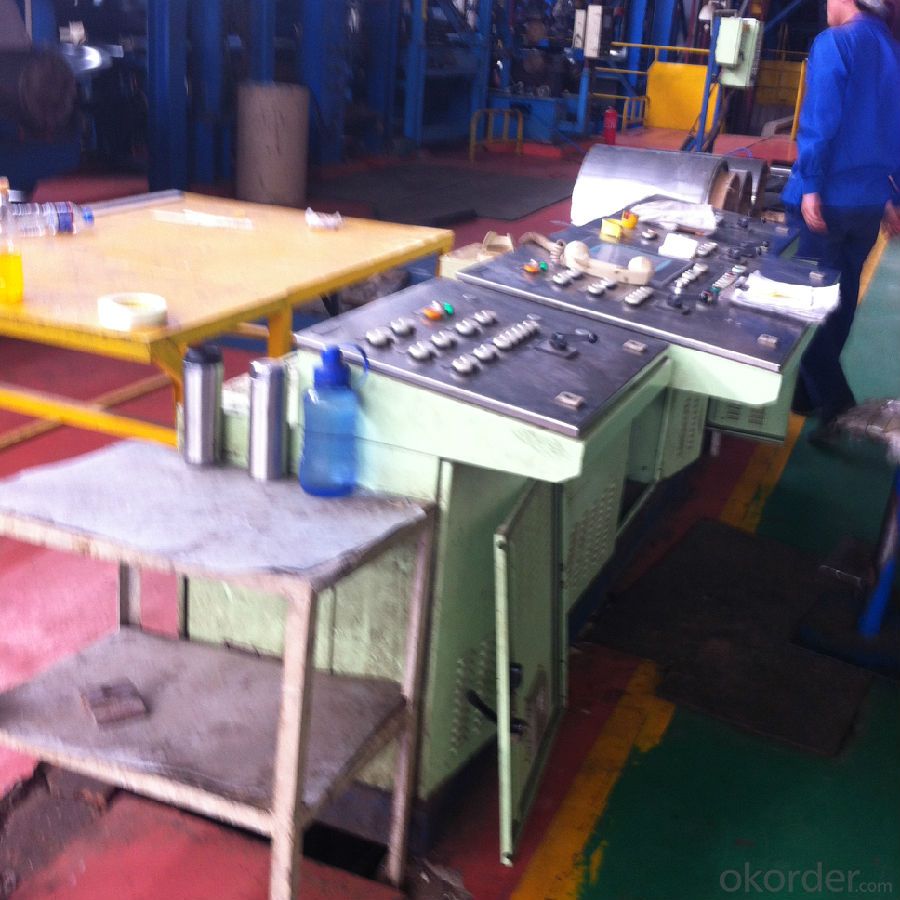
4. Features of the factory price/ tin free steel/tinplate/tfs/tmbp/etp/spte:
Beautiful Appearance
Excellent Paintability & Printability
Excellent Formability & Strength
Excellent Corrosion Resistance
Excellent Solderability & Weldability
5. FAQ:
We are one of the main producers in China for tinplate, tin free steel and also TMBP. At present, our productivity is more than 450000 MT/year.
For more information about our products or company, pls contact us freely.
- Q: What are the challenges in manufacturing tinplate?
- Some of the challenges in manufacturing tinplate include ensuring the uniformity of tin coating on the steel base, preventing corrosion during storage and transportation, maintaining the dimensional accuracy of the tinplate sheets, and addressing environmental concerns related to the disposal of tin and tin-containing wastewater. Additionally, meeting the specific quality requirements of different industries and managing the cost of production can also be challenging in tinplate manufacturing.
- Q: What are the main regulations governing tinplate production?
- The main regulations governing tinplate production include health and safety standards, environmental regulations, quality control measures, and labeling requirements. These regulations ensure that tinplate production processes are conducted safely, with minimal impact on the environment, and that the final product meets quality standards. Additionally, labeling requirements ensure that tinplate products are accurately labeled and provide necessary information to consumers.
- Q: How does tinplate perform in terms of product protection?
- Tinplate performs exceptionally well in terms of product protection. Its strong and durable nature ensures excellent resistance against corrosion, moisture, and oxygen, thus safeguarding the contents from external elements. Additionally, its ability to provide an airtight seal helps in preserving the product's freshness, flavor, and quality for an extended period. Overall, tinplate is a reliable and efficient packaging material for ensuring optimal product protection.
- Q: What are the different tinplate grades available in the market?
- There are several different tinplate grades available in the market, including prime quality, secondary quality, and surplus quality. Prime quality tinplate is the highest grade and is typically used for food packaging and other high-quality applications. Secondary quality tinplate may have minor imperfections but is still suitable for a wide range of applications. Surplus quality tinplate is typically sold at a lower price and may have more noticeable imperfections, making it suitable for less demanding uses.
- Q: Can tinplate be used for packaging frozen food?
- Yes, tinplate can be used for packaging frozen food. Tinplate is a type of steel coated with a thin layer of tin, which provides excellent protection against moisture, oxygen, and light. This makes it suitable for packaging frozen food as it helps to maintain the quality and freshness of the product by preventing freezer burn and preserving its taste and texture. Tinplate is also durable and can withstand low temperatures without warping, making it a reliable choice for frozen food packaging.
- Q: What are the different types of tinplate coatings?
- There are several different types of tinplate coatings used for various purposes. These include electrolytic tinplate (ETP), tin-free steel (TFS), black plate, and lacquered tinplate.
- Q: What are the main factors affecting tinplate coil storage?
- The main factors affecting tinplate coil storage include temperature, humidity, exposure to moisture, cleanliness of the storage area, and proper stacking techniques.
- Q: What is the process for printing on tinplate?
- The process for printing on tinplate typically involves several steps. First, the tinplate sheets are cleaned and coated with a layer of primer to ensure proper adhesion of the ink. Then, the desired design or artwork is printed onto the tinplate using specialized printing techniques such as lithography or offset printing. After the printing is complete, the tinplate is usually coated with a protective varnish or lacquer to enhance its durability and resistance to corrosion. The printed tinplate sheets can then be further processed into various products, such as tin cans or decorative tin containers.
- Q: What is the purpose of coating tinplate?
- The purpose of coating tinplate is to provide a protective barrier against corrosion and to enhance the appearance of the metal surface.
- Q: How is tinplate coated with water-based paints?
- Tinplate is coated with water-based paints through a process called coil coating. In this process, the tinplate is cleaned, pre-treated, and then coated with a water-based paint using a roller or spray method. The paint is then dried and cured at high temperatures to ensure adhesion and durability. The water-based paints are preferred due to their environmental friendliness and ease of application.
Send your message to us
Tinplate Used for Aerosal Cans in Packaging Industry
- Loading Port:
- China main port
- Payment Terms:
- TT OR LC
- Min Order Qty:
- 25 m.t.
- Supply Capability:
- 30000 m.t./month
OKorder Service Pledge
OKorder Financial Service
Similar products
Hot products
Hot Searches
Related keywords
